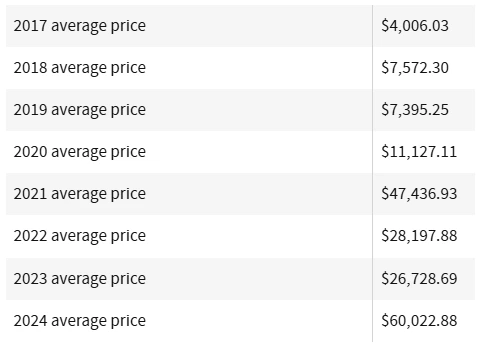Cryptocurrency has transformed from a tech experiment into a powerful, widely discussed digital asset class.
At its core, cryptocurrency is a digital currency that relies on cryptography for security, making it almost impossible to counterfeit or manipulate.
Bitcoin, launched in 2009, became the first and most popular cryptocurrency. Since then, thousands of cryptocurrencies have entered the market, creating a vast ecosystem for digital finance.
Today, cryptocurrency isn’t just for tech enthusiasts, it's a mainstream topic.
Many people are exploring crypto to diversify investments or as an alternative to traditional money. So, what makes cryptocurrency so appealing?
Let’s dive into what it is and the benefits it offers.
SEE ALSO : Create Your Own Cryptocurrency ICO Tokens
How Did Cryptocurrency Transactions Work?
Step 1: Initiating a Transaction: When you want to send cryptocurrency, such as Bitcoin, you create a transaction request. This request includes:
- The recipient's wallet address (a unique identifier for their cryptocurrency account).
- The amount of cryptocurrency you wish to send.
- Your digital signature verifies that you are the owner of the funds.
Step 2: Broadcasting the Transaction: Once you create the transaction, it is broadcast to the cryptocurrency network. This means your transaction request is shared with all the nodes (computers) in the network, allowing them to see and verify it.
Step 3: Mining Process:
Validation by Nodes: The nodes receive your transaction and begin the validation process. They check whether you have enough funds and whether the transaction is legitimate.
Solving Mathematical Problems: To add your transaction to the blockchain, nodes (or miners) compete to solve complex mathematical puzzles. This process is known as mining. The first miner to solve the puzzle gets to add the new block of transactions (including yours) to the blockchain.
Step 4: Confirming the Transaction: It is confirmed once a miner successfully adds your transaction to the blockchain. This means:
- The transaction is now permanent and cannot be altered.
- Other nodes will update their blockchain copies to include this new information.
Step 5: Finalization: After your transaction is confirmed, it becomes part of a public ledger that everyone in the network can see. This transparency ensures that all transactions are verifiable and helps maintain trust within the network.
Step 6: Completion: The recipient can now access the funds in their crypto wallet.
The entire process from initiating the transaction to final confirmation typically takes only a few minutes, depending on network congestion and transaction fees.
Types of Cryptocurrency
There are many cryptocurrencies than just Bitcoin. Here are a few main types of cryptocurrencies:
Bitcoin (BTC): The first and most widely known cryptocurrency, often called “digital gold.” It’s primarily used as a store of value.
Ethereum (ETH): Ethereum introduced intelligent contracts and programmable transactions, allowing decentralized applications (dApps) to be added to its network. It’s the foundation of many innovative blockchain projects.
Stablecoins: These are tied to stable assets like the US dollar. Tether (USDT) is a popular stablecoin that helps users avoid the volatility of most cryptocurrencies.
Altcoins and Tokens: There are thousands of other cryptocurrencies, often called altcoins. Some, like Litecoin and Cardano, offer unique features, while tokens like Chainlink and Uniswap are used within specific decentralized applications.
Each cryptocurrency serves a different purpose and appeals to user needs, from digital payments to decentralized finance.
Incredible Benefits of Cryptocurrency
Cryptocurrency brings incredible benefits, making it a promising alternative to traditional financial systems.

Let’s explore some of the most significant advantages:
1. Decentralization and Control
Cryptocurrencies operate on decentralized networks, meaning governments or banks do not control them. This gives people direct control over their finances, free from the influence of third parties.
There is no need to worry about bank fees or government-imposed restrictions crypto transactions let users have full autonomy over their funds.
2. Lower Transaction Fees
One of the biggest perks of crypto is the potential to save on fees.
With traditional financial institutions, cross-border transfers can rack up fees, especially when converting currencies. Crypto can be much cheaper by cutting out intermediaries, making it ideal for international transactions.
3. Fast and Borderless Transactions
Transactions with cryptocurrency are practically instant, regardless of where you send or receive money.
Unlike traditional banking, which may take days to clear international transfers, crypto allows funds to move across borders in minutes. It’s precious for people sending money to family abroad or businesses making cross-border payments.
4. Increased Privacy and Security
Cryptocurrencies offer a layer of privacy by not linking transactions to personal identity.
While they’re not entirely anonymous, crypto transactions are generally more private than traditional payment methods. And since they’re based on secure blockchain technology, crypto transactions are far more difficult to hack or tamper with.
5. Financial Inclusion
Cryptocurrencies provide financial services to people who don’t have access to traditional banking, especially in underdeveloped regions.
A smartphone and internet connection are enough to start using crypto. This opens up financial opportunities for millions of people, allowing them to save, invest, and transact without needing a bank account.
6. Investment Opportunities and Portfolio Diversification
Cryptocurrency has evolved into a popular investment asset.
Many investors consider it a way to diversify their portfolios, given its lack of correlation with traditional assets like stocks and bonds.
For those with a higher risk tolerance, crypto investments have shown high returns and offer a new avenue for wealth creation.
7. Transparency and Accountability
Every transaction on a public blockchain is open for anyone to view, adding a layer of transparency not often seen in traditional finance. This helps hold all parties accountable, reducing fraud and corruption in financial systems.
Since the data on the blockchain is immutable, it cannot be altered or manipulated, ensuring trust among users.
8. Empowerment of Smart Contracts
One of the most exciting features of cryptocurrencies, particularly Ethereum, is the concept of smart contracts. These self-executing contracts are agreements in which the terms of the agreement are directly written into code.
Smart contracts allow the creation of decentralized applications (dApps), automating complex processes, and enforcing terms without needing an intermediary.
Risks and Challenges of Cryptocurrency
While cryptocurrency offers numerous advantages, there are some risks to keep in mind:
1. Volatility
Cryptocurrency prices are known for their extreme fluctuations. For example, Bitcoin’s price can swing significantly in just a few days, which can be challenging for investors and companies that accept crypto as payment.
Over the years, Bitcoin's price has gone up and down a lot, reaching record highs and then dropping sharply, showing how unstable it can be and how it reacts to market trends and news.

2. Regulatory Issues
Since cryptocurrency operates independently of central authorities, it has faced regulatory challenges. Some governments have restricted crypto use, while others are exploring ways to integrate it safely into their economies.
3. Security Concerns
Although blockchain technology is secure, there are risks associated with cryptocurrency exchanges and wallets. Hacks and scams are shared, so using reputable platforms and maintaining secure storage is essential.
4. Lack of Widespread Adoption
While adoption is growing, cryptocurrency is still not widely accepted as a payment method in many places. This limits its usability and means traditional currency is still the primary business method.
Future Potential of Cryptocurrency
Looking ahead, the future of cryptocurrency holds exciting possibilities:
Mainstream Adoption: As more companies and financial institutions embrace cryptocurrency, its mainstream acceptance may grow, bringing stability and accessibility.
Decentralized Finance (DeFi): Cryptocurrency fuels the DeFi movement, which aims to recreate traditional financial systems like lending, borrowing, and insurance without intermediaries. This movement has the potential to make finance more accessible and efficient.
Role in the Metaverse and Digital Economy: Cryptocurrency could be a critical tool in emerging digital spaces, like the metaverse, where virtual assets and digital interactions create new economies. Cryptocurrencies like Ethereum could enable users to own and trade virtual assets seamlessly.
Conclusion
Since its inception, cryptocurrency market has evolved from a niche technology to a powerful financial tool. Its decentralization, security, and accessibility make it attractive to many users, from those seeking investment opportunities to those in regions without banking infrastructure.

Of course, it has its challenges, but with careful consideration, cryptocurrency offers a promising alternative to traditional finance.
Whether you’re curious about the tech or looking to diversify your investments, exploring cryptocurrency can be an exciting journey into the future of finance. With ongoing developments and increasing adoption, we’re likely just beginning to see crypto's impact on the world.
FAQs
Q: What are the main benefits of cryptocurrency?
A: The advantages of cryptocurrency are numerous and multifaceted.
Firstly, cryptocurrencies are decentralized, meaning that they operate independently of a central authority, such as a government or financial institution. This can provide users with greater control over their digital assets.
Additionally, the use of blockchain technology ensures that all cryptocurrency transactions are transparent and secure.
Furthermore, cryptocurrencies can offer lower transaction fees compared to traditional banking systems, making them an attractive option for those looking to trade cryptocurrencies efficiently.
Lastly, they provide access to a global financial system, allowing individuals in underbanked regions to participate in the cryptocurrency market.
Q: What are the risks associated with investing in cryptocurrency?
A: While there are numerous advantages of cryptocurrency, there are also significant risks to consider. The most notable is the volatility of the cryptocurrency market, where prices can swing dramatically in a short period. This can lead to substantial financial losses for investors.
Moreover, the lack of regulation in many jurisdictions means that there may be fewer protections in place for investors, increasing the risk of fraud or the failure of cryptocurrency exchanges.
Additionally, the technical complexity of managing a crypto wallet and understanding private keys can be daunting for novice users.
Q: How does cryptocurrency work?
A: Cryptocurrency is essentially a digital currency that uses cryptography for security. Transactions are recorded on a blockchain, which is a decentralized ledger that ensures transparency and prevents tampering.
Each transaction is added to a block, and once the block is filled, it is linked to the previous block, creating a chain. This process makes it nearly impossible to alter transaction history. Users can buy cryptocurrency through cryptocurrency exchanges and store them in a digital wallet, accessed via an internet connection.
Each wallet is protected by a private key, which is crucial for authorizing transactions.
Q: What is the process of buying cryptocurrency?
A: To buy cryptocurrency, follow these simple steps:
- Choose an Exchange: Select a reputable platform like Coinbase or Binance.
- Create an Account: Sign up and verify your identity.
- Deposit Funds: Add money via bank transfer or credit card.
- Select Cryptocurrency: Choose the cryptocurrency you want to buy.
- Place an Order: Enter the amount and complete your purchase.
- Store Your Crypto: Transfer it to a secure wallet if desired.
That’s it! You’re now a cryptocurrency owner.


